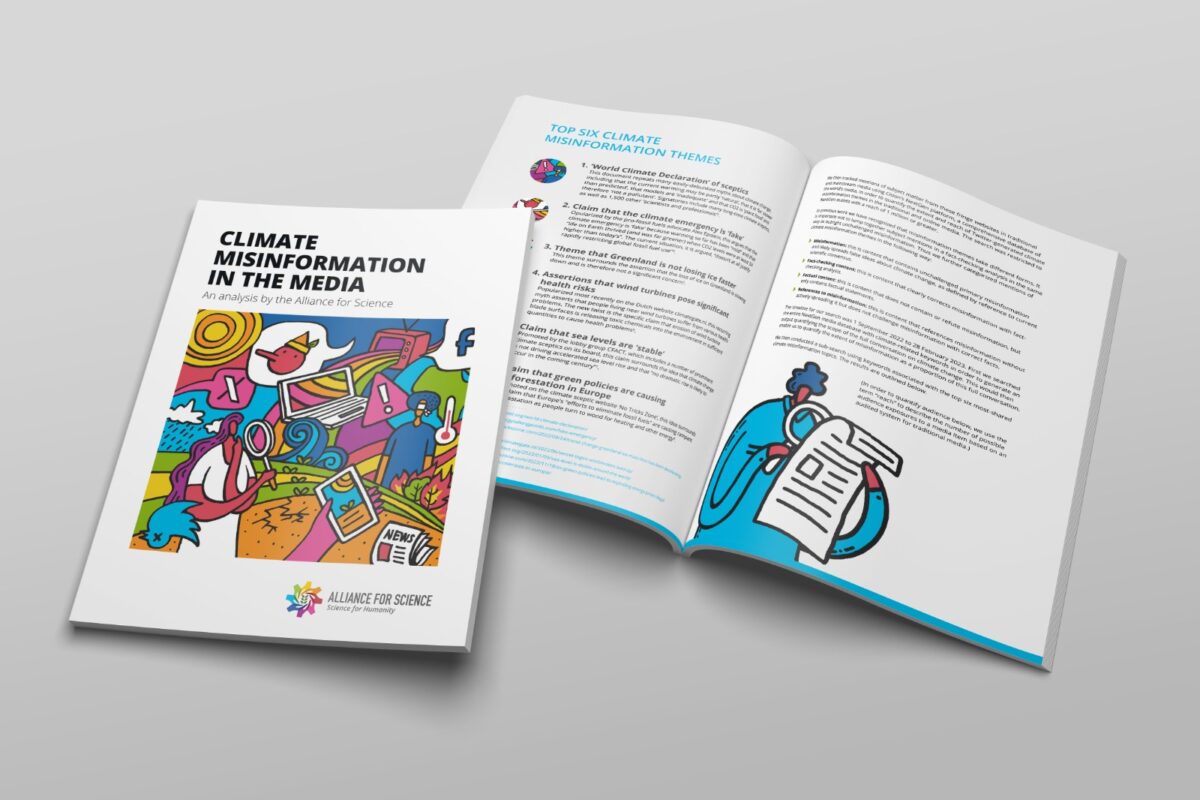The Alliance for Science conducts original research, intended to dispel misinformation and provide insights into scientific issues, including COVID conspiracies and dubious health claims, vaccine hesitancy, climate change, and agricultural biotechnology.

Publications list:
• 24 October 2023: ‘The €3 Trillion Cost of Saying No: How the EU Risks Falling Behind in the Bioeconomy Revolution’. Co-written with the Breakthrough Institute, this report examines the future economic impacts of outdated laws which could prevent the use of ‘new genomic techniques’ in Europe. Not adopting NGTs could result in an annual economic opportunity cost of 182 to 356 billion dollars for the EU, it finds. The report further projects that this could compound to over 3.2 trillion dollars over a decade. Press release/blog or full study in PDF.
• 5 September 2023: ‘Climate change misinformation in the media’ launched at Nairobi climate action zone. This paper found that climate misinformation was vanishingly rare in the high-impact media, occurring at a rate of only 0.02%. Press release/blog or full study in PDF.
• 28 June 2023: Alliance for Science authors published a study in the journal GM Crops & Food entitled ‘Gene editing achieves consistently higher favorability in social and traditional media than GMOs’. Read the news release here or the full study (open access).
• 16 February 2023: Analysis of misinformation about GMOs in the Kenyan media. Read our news release or the full study in PDF.
• 17 November 2022: New paper published in GM Crops & Food – Misinformation in the media: global coverage of GMOs 2019-2021. News release and full paper available online. Citation: Lynas, M., Adams, J., Conrow, J. Misinformation in the media: global coverage of GMOs 2019-2021. GM Crops & Food (2022) DOI: 10.1080/21645698.2022.2140568
• A survey of the perceptions that consumers in the United States have about the use of gene editing in addressing agricultural and environmental challenges. The survey, which found that consumers have little knowledge of the tool but hold generally favorable views of its use, was conducted by Hemispheres in collaboration with the Alliance for Science and Foundation for Food and Agriculture Research. This survey was used to inform the development of an evidence-based gene editing messaging kit that may be downloaded and used by communicators. Spanish-language versions of the survey report and gene editing messaging kit may also be downloaded.
• A paper, published in the peer-reviewed, open-source academic journal GM Crops & Food, that found the traditional and social media conversation around genetically modified organisms (GMOs) became steadily more positive between 2018 and 2020. The analysis represents one of the most comprehensive views of GMO perception within both social media platforms and general news media, leveraging over three years of continuous tracking and analysis. Here is a common-language version of the study.
Citation: (2022) The state of the ‘GMO’ debate – toward an increasingly favorable and less polarized media conversation on ag-biotech?, GM Crops & Food, 13:1, 38-49.
• A paper, published in the peer-reviewed journal Environmental Research Letters, that found with high statistical confidence that the scientific consensus on human-caused contemporary climate change—expressed as a proportion of the total publications—exceeds 99% in the peer reviewed scientific literature.
Citation: Lynas, M., Houlton, B. & Perry, S., 2021: ‘Greater than 99% consensus on human caused climate change in the peer-reviewed scientific literature’, Environmental Research Letters, 16, 114005.
• Alliance for Science experts co-authored an open-access study on vaccine misinformation in the media, published in the journal BMJ Open in March 2022.
Citation: Lurie, P., Adams, J., Lynas, M., Stockert, K., Carlyle, R., Pisani, A. & Evanega, S.: ‘COVID-19 vaccine misinformation in the English-language news media: retrospective cohort study’, BMJ Open, 2022; 12:e058956. doi:10.1136/ bmjopen-2021-058956s
• A study quantifying sources and themes in the COVID-19 ‘infodemic’ that found former President Donald Trump was the single greatest source of COVID misinformation in 2020.
Citation: Evanega, S., Lynas, M., Adams, J. & Smolenyak, K., 2020: ‘Quantifying sources and themes in the COVID-19 ‘infodemic’’, Alliance for Science, Cornell Unviversity.
